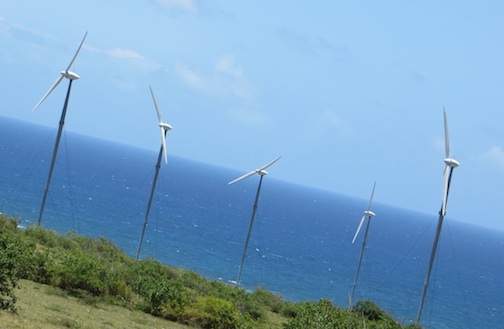World Bank: Central America, Caribbean Can Reduce Dependence on Oil
Above: a wind farm in Nevis (CJ Photo)
By the Caribbean Journal staff
Central American and Caribbean countries can reduce their dependence on oil through a combination of renewable energy, energy efficiency initiatives and regional energy integration, according to a new report from the World Bank.
A strategy combining diversified power systems, better energy efficiency in electricity production and regional integration could “significantly reduce” the area’s vulnerability to high and volatile oil prices, according to Ede Ijjasz-Vasquez, World Bank Director for Sustainable Development in the Latin American and Caribbean region.
“Because of their exposure to oil price fluctuations, less oil dependency can have a positive effect on these countries’ fiscal balance[s] and ultimately benefit the poorest sectors of the population.”
Implementing such measures could lead to an average improvement in current account balance of approximately 1.6 percent of GDP, according to the report.
Guyana could witness a reduction in its account deficit of as much as 5 percent, while Haiti could see a 3 percent reduction.
For Central America and the Caribbean, a 10 percent increase in renewable potential capacity could lead to savings of 14.2 million and 5.6 million barrels of diesel and heavy fuel, respectively, or an average reduction of almost 1 percent of GDP.
Jamaica would achieve the biggest fuel savings of any country in the Caribbean by taking advantage of energy-efficiency strategies, according to the report.







